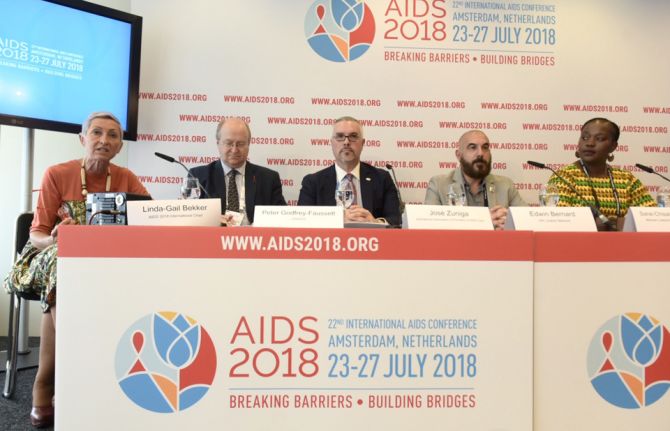

Press Release
Leading experts call on the criminal justice system to ensure science informs the application of the law in criminal cases related to HIV
25 July 2018 25 July 2018Prosecutions of people living with HIV for acts that pose no risk of HIV exposure or transmission prompt scientists to issue a statement urging the criminal justice system to use science when considering prosecution of HIV non-disclosure, exposure or transmission
AMSTERDAM/GENEVA, 25 July 2018—A group of 20 leading HIV scientists from around the world have issued a scientific consensus statement urging governments and people working in the legal and justice systems to pay close attention to the significant advances in HIV science to ensure that science informs the application of criminal law in cases related to HIV.
“Science has greatly advanced in recent years which has been critical in allowing countries to make evidence informed decisions in their HIV programming,” said Michel Sidibé, Executive Director of UNAIDS. “With all the new scientific advances now available we need to continue to use science as evidence to deliver justice. No one should face criminalization because of a lack of information or understanding by the justice system about the risks of HIV transmission.”
The expert group of scientists, convened by UNAIDS, the International Association of Providers of AIDS Care (IAPAC) and the International AIDS Society, warn that an overly broad and inappropriate application of criminal law against people living with HIV remains a serious concern across the globe. Around 73 countries have laws that criminalize HIV non-disclosure, exposure or transmission, and 39 countries have applied other criminal law provisions in similar cases.
“Many of these laws do not take into account measures that reduce HIV transmissibility, including condom use, and were enacted well before the preventive benefit of antiretroviral therapy or pre-exposure prophylaxis was fully characterized,” said José M. Zuniga, IAPAC President and Chief Executive Officer. “Most people living with HIV who know their status take steps to prevent transmitting HIV to others. Laws that specifically criminalize HIV non-disclosure, exposure, or transmission thus primarily exacerbate HIV-related stigma and decrease HIV service uptake.”
Most prosecutions have occurred based on perceived risk of HIV transmission through sexual activity. Some have also occurred for biting, spitting or even scratching. Prosecutions, and convictions, have often been influenced by a lack of knowledge or appreciation of scientific evidence regarding the possibility of transmission of the virus. In many instances, they have been influenced by deep-rooted stigma and fear associated with HIV, which still exists despite the huge advances in HIV treatment and prevention.
“We support this globally relevant expert consensus statement, for which we have been long-time advocates,” said HIV Justice Network’s Senior Policy Analyst Sally Cameron, on behalf of the Steering Committee of HIV Justice Worldwide, a global civil society coalition campaigning to end unjust prosecutions. “HIV criminalization is a growing global phenomenon that unfairly targets people living with HIV through criminal prosecutions and harsh penalties. This welcome statement makes the case that our current understanding of HIV science, alongside key human rights and legal principles, does not support this miscarriage of justice.”
The peer-reviewed consensus statement, endorsed by 70 additional scientists from around the world, was released today in the Journal of the International AIDS Society. It describes scientific evidence on the possibility of HIV transmission under various circumstances, the long-term impact of HIV infection and the means of proving HIV transmission so that it is better understood in criminal law contexts.
Based on a detailed analysis of the best available scientific evidence on HIV transmission and treatment effectiveness, the statement notes that there is no possibility of HIV transmission through saliva as a result of biting or spitting, even where saliva contains small quantities of blood. There is no to negligible possibility of HIV transmission where a condom is used correctly during sex, or where a partner living with HIV has an undetectable viral load.
In addition, effective antiretroviral therapy, low viral load, the use of pre-exposure prophylaxis (antiretroviral drugs taken by an HIV-negative person before a possible exposure), or post-exposure prophylaxis (antiretroviral medicines taken after a possible exposure) all significantly reduce the possibility of HIV transmission.
International guidance on HIV in the context of the criminal law recommends that “proof of causation, in relation to HIV transmission, should always be based on evidence derived from a number of relevant sources, including medical records, rigorous scientific methods and sexual history” (Ending overly broad criminalization of HIV non-disclosure, exposure and transmission: critical scientific, medical and legal considerations).
The experts recommend strongly that more caution be exercised when considering criminal prosecution, including careful appraisal of current scientific evidence on HIV risk and harms. The consensus statement is expected to help policymakers, prosecutors and courts be guided by the best available science and thereby avoid the misuse of the criminal law, as is currently happening in many countries worldwide.
Read the full Expert Consensus Statement on the Science of HIV in the Context of Criminal Law
UNAIDS
The Joint United Nations Programme on HIV/AIDS (UNAIDS) leads and inspires the world to achieve its shared vision of zero new HIV infections, zero discrimination and zero AIDS-related deaths. UNAIDS unites the efforts of 11 UN organizations—UNHCR, UNICEF, WFP, UNDP, UNFPA, UNODC, UN Women, ILO, UNESCO, WHO and the World Bank—and works closely with global and national partners towards ending the AIDS epidemic by 2030 as part of the Sustainable Development Goals. Learn more at unaids.org and connect with us on Facebook, Twitter, Instagram and YouTube.
Press centre
Download the printable version (PDF)
